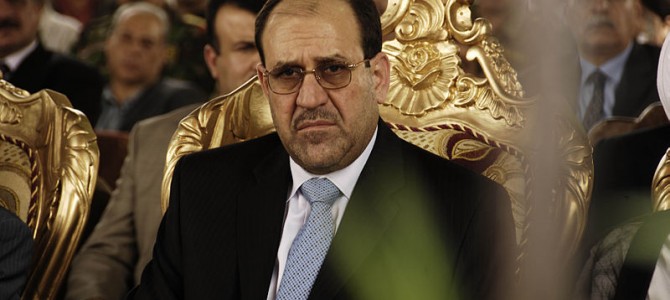President Obama has quite a knack for foreign policy: everything he touches seems to crumble.
The administration’s policy in Iraq, for example, was to use the Kurds in northern Iraq to hold back the advance of ISIS, buying time to broker a political solution in Baghdad that would win back the loyalties of alienated Sunnis.
The first prong of that strategy failed last week when ISIS broke through Kurdish lines—the Kurds had quite a lot of border to defend—and threatened Erbil. The second prong failed last night when the Iraqi parliament finally brokered a deal to push out their sectarian prime minister, Nouri al-Maliki, and Maliki responded by calling out Iraqi special forces and—if preliminary reports are correct—attempting to mount a coup.
I should note that this is not the first time such a policy has failed. It is basically similar to the Rumsfeld-Casey strategy pursued by the Secretary of Defense and the top general in Iraq prior to the surge. The idea was to use military force to suppress the insurgency across Iraq, buying time for diplomats to iron out a political accommodation in Baghdad. It didn’t work, of course, and one of the big lessons was that political accommodation follows military victory, not the other way around. The various sides will settle for the best deal they can get only when they’re convinced their side isn’t going to win anything in the field.
But the Obama administration hasn’t been particularly interested in learning any lessons from their predecessors, so they made the same mistake again—only worse—and Iraq is now in probably the worst shape it has been since Saddam’s era.
There are a number of reasons that Maliki probably thought he could get away with a coup.
To begin with, this would be unimaginable if there will still US troops in Iraq, because it would be very difficult for Iraqi forces loyal to Maliki to operate without American cooperation. Yet not only did President Obama withdraw all our troops; until a few months ago, he was asking Congress to rescind the very same authorization for military force that he is now relying on for our air strikes against ISIS.
Those airstrikes probably also emboldened Maliki. Now that the US is committed to serving as the Iraqi air force against the Islamists, he figures we have to back whatever government holds sway in Baghdad. But this is also a judgment about the weakness of our leaders. He assumes that President Obama will accept a coup if it is presented to him as a fait accompli.
And he has plenty of reason to think this. The usual pattern of Obama’s foreign policy has been for the president to dither while others create facts on the ground, and then for him to accept those facts once they’ve been created. Repeatedly—in Egypt, in Syria, in Ukraine, in Iraq, and for all but about six weeks in Libya—the Obama Doctrine has amounted to: let me know who wins.
So of course Maliki is not afraid to cross Obama. Nobody else is.
The result is that dictatorship is regaining global momentum, in Eastern Europe (Russia and now Hungary), in South America (Venezuela), and in the Middle East (Egypt, Turkey, Syria). So why shouldn’t Maliki think he can join the trend, and that fellow members of the dictators’ club—particularly his sponsors in Tehran and Moscow—will back him up?
It reminds of a Jay Leno joke, recently popularized by Ted Cruz, in which he touts the “Obama Diet”: “Every day I let Vladimir Putin eat my lunch.”
If Maliki is mounting a coup, it’s simply because Iraq has gone on the Obama Diet.
Follow Robert on Twitter.









